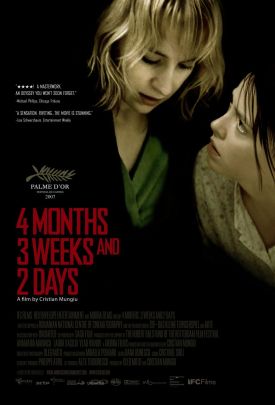4 Months, 3 Weeks, 2 Days
As I was coming out of a screening of 4 Months, 3 Weeks, 2 Days, as shaken up by the experience as I imagine everyone who has seen the film must be, I accidentally fell into step behind a couple — she in her 20s or early 30s, he considerably older, both elegantly dressed — who were making their reaction to what they had seen a matter for public remark. Actually, it was the woman who was doing most of the talking while the man, in a considerably lower voice, sounded as if he was trying to pour oil upon troubled waters. He probably was, too. She was saying that the entire Supreme Court should be made to see this movie, as this is what our country would look like if Roe v. Wade were to be overturned. That was why, in case anyone wanted to know, she had at some demonstration or other been known to scream in public — she was not far off it now — as she had joined with other women to keep abortion legal, and why she would be doing it again.
As we parted ways on coming out of the building, I heard the word “Bush” more than once, and not in a nice tone, but I missed the rest of this lady’s harangue and all of the reaction to it of her softer-voiced companion. Hers, I thought, was an understandable response to what must be one of the most harrowing depictions of an abortion ever shown on film and a picture that well deserved the Palme d’Or that it won at Cannes last year. Yet it seemed odd that all she could see of it afterwards was the fact that, having taken place in Romania during the dying days of the oddly puritanical Ceausescu regime, now nearly 20 years in the past, the abortion had been an illegal one. However horrible its illegality had made it — and that’s pretty horrible — it’s hard to see how that could so completely blind someone to the horror — for such it also certainly is — of the abortion itself. Such are the powers of ideology.
To be fair, the Romanian film-maker, Cristian Mungiu, had to some extent encouraged such a reaction by stressing the predatory nature of the abortionist, who bears the grimly comical nom de guerre of Mr Bebe (Vlad Ivanov) and who uses in vile and degrading ways his advantage — created by the fact that they are engaged in a criminal conspiracy — over the two frightened college students, Gabita (Laura Vasiliu) and Otilia (Anamaria Marinca) who employ him Yet Mr Mungiu, unlike so many of his pro-choice feminist fans, is at least as interested in the evils of the unnamed “procedure” as he is in those that ensue from its illegality. Naturally this makes him more difficult to classify ideologically than either side in the abortion debate would like him to be, but as the woman I overheard demonstrated, there is nothing to stop the dedicated ideologue from simply ignoring the parts of the film she doesn’t care to see.
These include, it should be said up front, an unblinking, unabashed shot of an aborted foetus. This, Mr Mungiu was quoted in the press as saying, “makes a point — people should be aware of the consequences of their decisions.” Just so. But there is more to his film than this. It’s hard to tell about Gabita, who is weak, sly and manipulative, as willing to take advantage of her friend as Bebe is to take advantage of both of them, but for Otilia the terrible price she is willing to pay for her friend’s abortion is all part of her more general determination to do whatever is necessary to break free of what the totalitarian communist régime has made the prison of her peasant origins. On more than one occasion, she tells us that she is studying “Tech” at the university because Tech students are not sent to the country. Gabita comes from the same rural home town as she, and her loyalty to her, for which she pays such a high price, seems to be part and parcel of her ambition to improve her own lot in life.
Mr Mungiu has also explained that what he was trying to convey was that, “Because of the pressure of the regime, women and families were so much concerned about not being caught for making an illegal abortion that they didn’t give one minute of thought about the moral issue.” It makes sense, I guess. Which of us can be sure how we might act if we were subject to the desperation created by living under a totalitarian régime? That desperation serves in the film, by motivating the abortion, to reinforce the pro-life view of the momentousness of such an act. Or, to put it another way, I wonder what could have been the excuse of the well-dressed fan of Roe v. Wade whom I overheard for her giving not one minute’s thought to the moral issue? She does seem rather to have missed the point, doesn’t she?
In fact, you could argue that Mr Mungiu is making the case that abortion should be not only legal but compulsory for such a feckless nincompoop as Gabita. Here is a woman who has learned to exploit her own helpless stupidity in order to make other people do things for her. She stumbled into getting pregnant and then she stumbled into an abortion, an abortion for which poor Otilia has to pay all the considerable ancillary expenses. A eugenicist might be just as enthusiastic about this movie, as ready to see it as confirming his own views about the world, as the pro-choice woman I followed out of the cinema. Such people, this hypothetical eugenicist might say — if anyone could be got to admit to being a eugenicist these days — such people as Gabita should be sterilized or, failing that, subjected to compulsory abortion on every one of the doubtless many occasions when she will fall pregnant through her own heedlessness and stupidity.
In other words, there are several ways to forget or ignore or literally to annihilate the innocent party to this transaction. Arguably, by making their movies all about the feelings of those who have the child’s fate in their hands, the makers of such ostensibly pro-life Hollywood films as Knocked Up and Juno have also found a way to ignore it. In Juno, the unborn child’s finger-nail is enough to motivate the heroine’s “choice,” but this makes it seem merely whimsical and therefore indirectly and even paradoxically confirms the pro-choice view, just as the opposite “choice” in 4 Months does the pro-life view. At one point, Otilia stops to admire some “cute” new-born kittens on her way to arrange her friend’s abortion, as if to remind us that the sentimentalism that comes so easily to Hollywood is an irrelevance in the lives of those who are forced to look at things as they really are. There is nothing trivial about the act we are forced to witness in Mr Mungiu’s movie, and that makes it both more morally compelling and more true to life.
Discover more from James Bowman
Subscribe to get the latest posts to your email.






